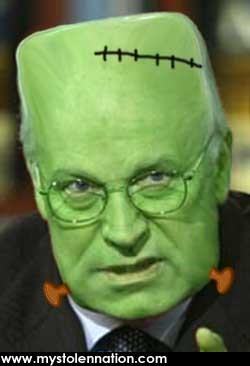Former Sen. David Durenberger writes in the Minneapolis Star Tribune:
The presidential candidates are debating whether Iraq or the economy is headed in the right direction, but no one can dispute that the health care trend line is going in the wrong direction.
With 5 million more uninsured Americans, bringing the total to 45 million (including a 12 percent increase in uninsured Minnesotans in the last year), family insurance premiums up more than $3,500 (including a 59 percent jump in Minnesota), prescription drug costs up over 70 percent, and businesses struggling to afford health care and stay competitive, there can be no doubt that we need to change our policy course.
Regardless of how voters view the candidates on all other issues, it is clear that the future of health care costs for Minnesotans has already been determined by President Bush's record of accomplishment. As a Republican, with some experience, I sincerely regret having to say the record over the last four years and the prescription for reform the president is proposing give me little confidence that this most challenging of all domestic priorities will be adequately addressed over the next four years.
His Medicare Modernization Act enhances access to prescription drugs for low-income, high-need seniors. It authorizes demonstrations to identify quality of care and chronic care management. But it all comes at a price neither taxpayers nor Medicare beneficiaries will be able to afford.
Drug companies have inflated prices from which "discounts" are derived and the Republican Congress has protected the drug companies from the price competition that Medicare applies to doctors, hospitals, and home health, dialysis and other care providers. President Bush and the GOP Congress have placed the future of Medicare in the hands of America's big health insurance plans and, again, protected them from the reality of competition with a guarantee of up to 123 percent higher payments than traditional Medicare.
The costs of all this will be borne not by those who profit most from health insurance or services, but by seniors and disabled Minnesotans whose Medicare premiums were increased 14 percent this year and will be 17 percent next year. With a budget deficit of more than $400 billion a year, that Medicare premium can only rise faster in the future. Plus, those of us working past age 64 will pay up to 80 percent of the costs to us of a Medicare program we have funded out of family income for the last 38 years.
President Bush's embrace of Health Savings Accounts would make little dent in the uninsured or in overall cost growth, but they would cut benefits and shift costs to workers. His Association Health Plans -- which are designed to pool certain businesses together and permit them to avoid most state consumer protection insurance laws -- would simply attract businesses with younger, healthier workers at the expense of others. His underfunded individual tax credits to be used in the fatally flawed and discriminatory individual market would -- like his other approaches -- undermine and weaken employer-based coverage and make it even more difficult to find insurance coverage for the least healthy among us.
The president constantly refers to Sen. John Kerry's health reform proposals as "big government." Not true. As one deeply involved in developing alternatives to President Bill Clinton's reform proposals, I must say that what Kerry proposes today for coverage expansion is in line with what mainstream Republican senators like Jack Danforth, John Chafee and I, working with Democrats like Bill Bradley, John Breaux and Kent Conrad, tried to accomplish in 1994.
Indeed, the Kerry plan appears designed to be responsive to those most in need -- people forced out of health care coverage by premium cost increases -- without being disruptive.
By providing employers and health plans with financial relief from catastrophic expenses, it should stabilize and make more affordable the employer-based insurance market. It opens up programs like the Congress' own Federal Employee Health Benefit Plan (FEHBP) and the Children's Health Insurance Program, and provides new private health insurance options -- not mandates -- for the uninsured.
By providing extra tax breaks for vulnerable groups like 55-to-64-year-olds, workers in between jobs, and small businesses, it ensures that health care is made even more affordable.
While far from perfect, it both builds on and learns from the past and takes us in a long-overdue new direction.
In this election people are making decisions on the basis of the candidates' stands on many issues. I have access to all of the health care I need through both FEHBP and Medicare. Like many Republicans, though, I believe our national goal is access for all, not just some.
For people who cannot afford the health insurance they need, for people whose access to care is threatened, the issue of which presidential candidate is most likely to come to their aid is their most important national security issue. It is the national security position on which President Bush and Sen. Kerry differ most and the one on which Kerry has the clearer vision for restoring security to all Americans.
David Durenberger, who was a U.S. senator from 1978 to 1995, is chair of the National Institute of Health Policy at the University of St. Thomas College of Business.






